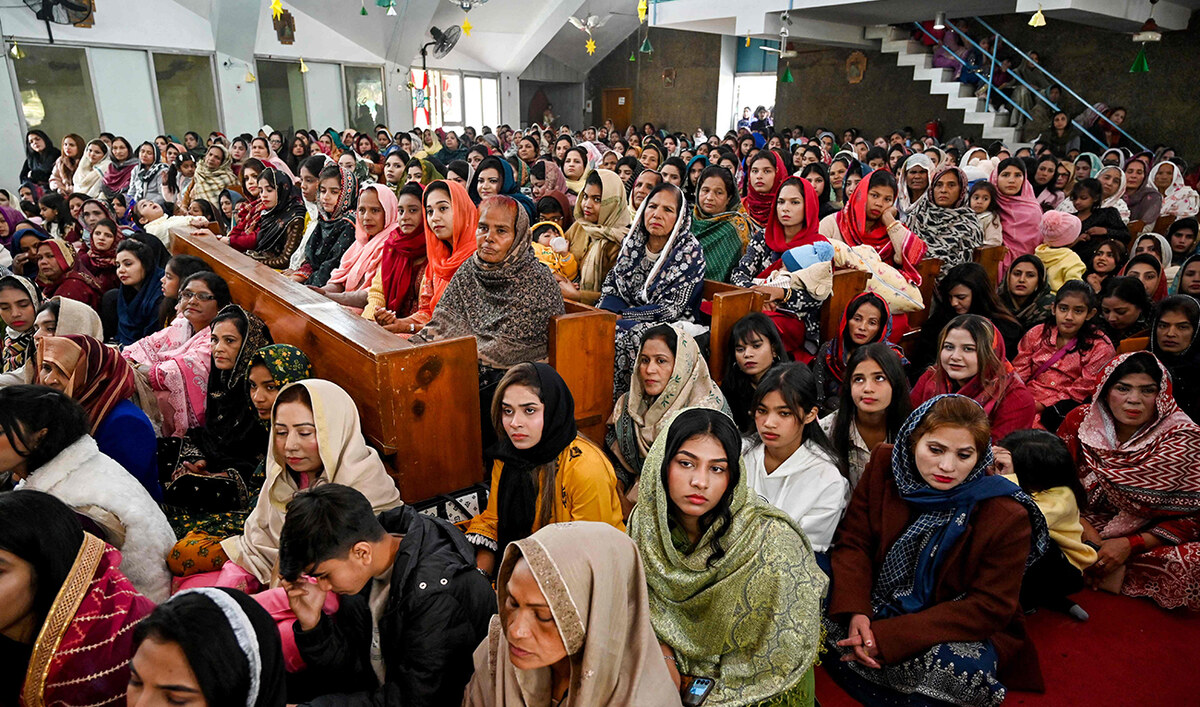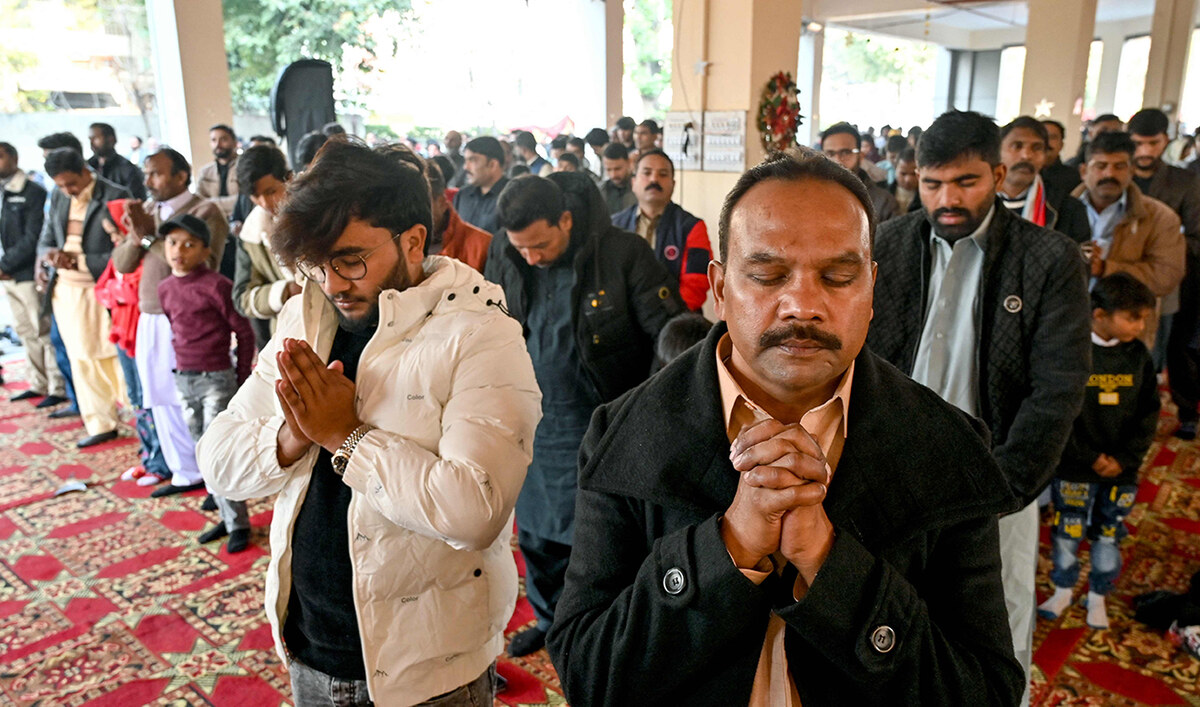ISLAMABAD: Military spokesperson Lt. Gen. Ahmad Sharif Chaudhry said on Monday there was no “softening” of the army’s stance on riots last year led by alleged supporters of ex-premier Imran Khan, calling a Baloch ethnic rights movement holding protests a “proxy” for militant groups.
Pakistan’s army said last month protesters taking part in a march in the southwestern city of Gwadar had attacked security forces deployed to guard them, killing one soldier and injuring 16 others.
A nationalist ethnic Baloch movement led by the Baloch Yakjehti Committee (BYC) had been demonstrating in the port city, blocking a highway to press their demands for the release of members of their movement they say were detained by security forces.
Pakistan’s southwestern Balochistan province, where the port city of Gwadar is located, borders Iran and Afghanistan and has long been the scene of a low-level insurgency by separatist groups who say they have been fighting for a greater share in the region’s rich mineral resources. The province, Pakistan’s largest by area but its most impoverished, is also central to Beijing’s economic interests in the region, which is funding the Gwadar port and other projects.
Addressing a press conference on Monday, the military spokesperson said the purpose of the BYC and the Baloch Raaji Muchi (Baloch National Grand Jirga) it had convened in Gwadar was to make development projects and investments “controversial” and incite people against the Pakistan army and other security forces involved in operations against militancy and crime.
“This Raaji Muchi, this is a proxy of terrorists and criminal mafia that has been exposed,” Chaudhry told reporters. “This is what the reality is. They are nothing more than proxy of terrorist organizations and illegal smugglers, this is a mafia.”
The BYC has held other protests in the past, including a long march to the capital to against enforced disappearances. Political leaders, human rights activists and families of victims have for decades spoken against enforced disappearances in Balochistan as well as killings by security agencies in staged encounters, a practice where officials claim the victim was killed in a gunfight though they were summarily executed. Authorities deny involvement in such incidents.
MAY 9 RIOTS
Answering a question about whether there was a softening of the army’s stance against May 9 rioters, Chaudhry said the army’s stance was “clear.”
“There is no change in it and neither will there be a change,” he said.
Alleged supporters of ex-PM Khan’s Pakistan Tehreek-e-Insaf (PTI) party attacked and damaged government and military installations on May 9, 2023, after his brief arrest that day in a graft case. The attacks took place a little over a year after Khan fell out with Pakistan’s powerful military, blaming the institution for colluding with his rivals to oust him from office in a parliamentary vote in April 2022. The military rejects the allegations.
Hundreds of PTI workers and leaders were arrested following the May 9 riots in a state crackdown and many remain behind bars as they await trial. The military has also initiated army court trials of at least 103 people accused of involvement in the violence. Many close Khan aides have since deserted him, due to what is widely believed to be pressure from the army, which denies interfering in politics.
Khan has been in jail since August last year, even though all four convictions handed down to him ahead of a parliamentary election in February have either been suspended or overturned. He has recently made a “conditional” offer of talks to the army, if “clean and transparent” elections were held and the “bogus” cases against his supporters were dropped.
The military — which has repeatedly said Khan and his party were behind the May 9 attacks on military installations — has ruled out any talks with him.
ANTI-TERROR OPERATIONS
Speaking about anti-terror operations across Pakistan, Chaudhry said at least 139 Pakistani soldiers had been killed in the campaigns during the first seven months of 2024.
Pakistan has faced a decades-long insurgency by separatists in the southwestern Balochistan province, while religiously motivated groups, including the Pakistani Taliban or the Tehreek-e-Taliban Pakistan (TTP), have waged a fight in the northwestern Khyber Pakhtunkhwa (KP) province that borders Afghanistan and launched attacks in other parts of the country also.
In recent months, both KP and Balochistan have seen a massive spike in terror attacks, with daily assaults on army, paramilitary and police forces, and targeted assassinations of security and government officials.
“139 Pakistan Army officers and soldiers embraced martyrdom in counter-terror operations,” Chaudhry told reporters, providing figures for 2024. “The entire nation pays tribute to these brave sons and their families.”
Security forces and law enforcement agencies had conducted 23,622 small and large-scale intelligence-based operations across the country this year, with 2,045 operations carried out over the last 15 days in which 24 militants had been killed, Chaudhry added.
He said Pakistan’s army, police, intelligence and law enforcement agencies were conducting over 100 operations against militants daily.
“Pakistan’s armed forces, law enforcement and intelligence agencies are fully focused on guaranteeing Pakistan’s external and border security,” the military spokesman said. “Our war against terrorism will continue till the last terrorist and the terrorism associated with him is not eliminated.”
Islamabad has blamed the rise in militant attacks in recent months on insurgents based in neighboring Afghanistan and says it has consistently taken up the issue with Kabul’s Taliban administration, raising tensions between the neighbors whose security forces have clashed at the border in recent months.
The Taliban government denies allowing the use of Afghan territory by militants.






















